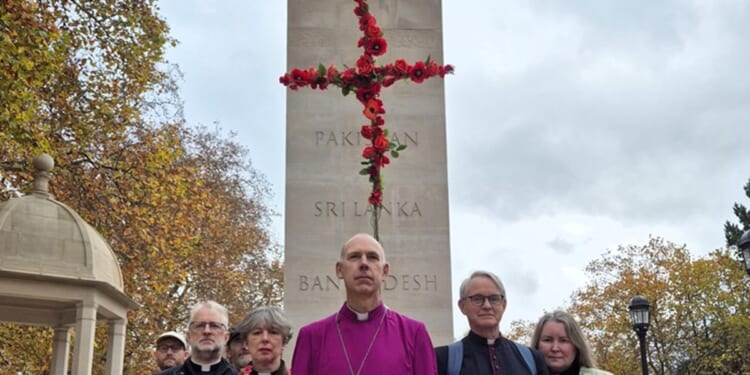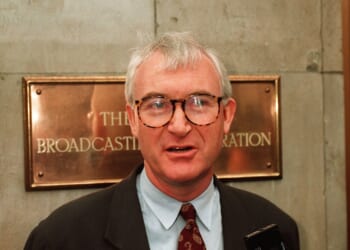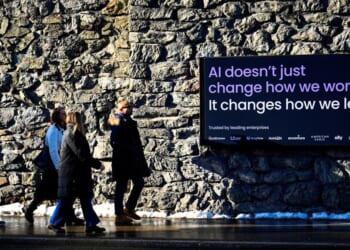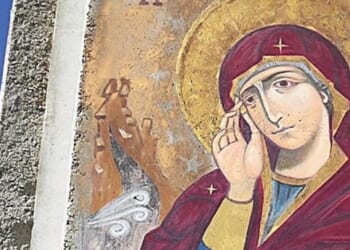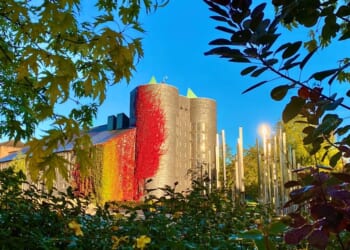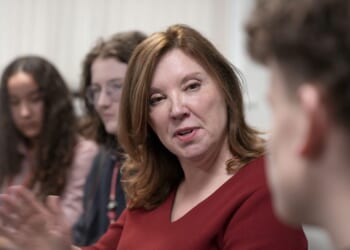A PRAYER walk was held in Hyde Park, London, on Friday to “reclaim” the Christian symbol of St George’s flag by remembering people born in other countries who fought for, contributed to, and “enriched” Britain.
The former Archbishop of Canterbury Lord Williams was among the bishops, clergy, and lay people to join the walk, which paused at the Commonwealth Memorial Gates. This commemorates the men and women from the Indian subcontinent, Africa, the Caribbean, and other Commonwealth countries who died in the Second World War. A large cross of woven red poppies and roses was held in front of one of the memorials at this site in remembrance of those who sacrificed their lives. Against the white memorial stone, this made the shape of a St George’s flag.
Holly-Anna Petersen, who attended the walk, said: “The act of creating the St George’s flag in this way was done to reclaim the flag as an inclusive symbol for Britain, and to ensure that, as a Christian emblem, it reflects the Christian principle of loving thy neighbour.”
Lord Williams said: “It is more than time to challenge the story that every migrant approaching our shores is an unfriendly alien with unintelligible and hostile values. It is essential for us to see, not enemy invaders, but vulnerable people like us, committed to finding safety for themselves and those they love. It is the height of injustice to hold communities responsible for the crimes of individuals and to market lazy, hurtful, stereotypes.”
He continued: “Christian culture, about which we hear so much from some quarters, is based simply on the recognition that we share common human needs and that we are given strength and generosity in Christ’s Spirit to serve those needs wherever they appear, and to welcome the gifts that strangers offer us.”
Some of the Christians involved in the prayer walk were founding members of the newly formed voluntary group Christians for a Welcoming Britain, which highlights these Christian values. Some walkers reflected on the growing inequality in the UK.
The Vicar of St Peter and St Paul’s, Chaldon, the Revd Helen Burnett, said: “A small number of mega-rich people are amassing ever-increasing fortunes, which is draining the country, leaving everyday people struggling to make ends meet. It’s immoral that we are seeing migrants used as scapegoats for this and being blamed for the lack of public funds resulting from years of deliberate austerity.
“Asylum seekers did not create this crisis; their plight has been manipulated to vilify them, when the fact is that they are struggling for a decent life like everyone else.”
The Bishop of Croydon, Dr Rosemarie Mallett, agreed. She said: “We are living in very trying times, and the cost-of-living crisis is not abating. . . All too often the media focus is on migration, while the root causes remain unaddressed.”
She concluded: “We must reject any narrative that says the cross is a symbol of exclusion. The cross calls us to a life of love and sacrifice.”
Acts of remembrance, church services, and parades were held in towns and cities across the country on Sunday. The Church of England’s national service was filmed across three locations: HMS Excellent in Portsmouth, RAF Cranwell, and the Armed Forces Chaplaincy Centre at Beckett House.
In a video message, the Archbishop of York issued a prayer “as we remember all those who died in warfare, and those who gave their lives for the peace that we enjoy, and mindful that there is so much warfare and conflict in our world today”.
The diocese of Blackburn produced special videos filmed on location at South Ribble War Memorial near Lostock Hall. Released on Remembrance Sunday, with more to be shown on 11 November, they feature schoolchildren from nearby Cuerden Church School, with their headteacher Mrs Nicola Sherry, and the Bishop of Blackburn, the Rt Revd Philip North.

